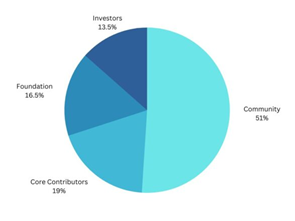Ethereum, Solana, Avalanche and the BNB Smart Chain are in the news, especially this year. The thing these chains have in common is that they are all layer 1 protocols.
Here is a quick refresher on what layer 1 means in the blockchain: These blockchains can verify and complete various transactions without needing another network. They are called layer 1 because they are the main networks within their ecosystem.
In addition to the already existing blockchains, there is now also the Aptos Blockchain from Aptos Laps. It promises scalability, security, reliability, and the ability to do updates. The consensus algorithm is based on proof-of-stake and combines parallel transaction processing with the newly developed contract language “Move”. The theoretical transaction data throughput will reach over 100,000 transactions per second.
The developers, Mo Shaikh and Avery Ching, two former Meta engineers, have already been working on Aptos for three years, and it is considered the technological successor to Meta’s abandoned blockchain project Diem.
The specifics of Aptos:
Move’s object model is a new programming language for smart contracts, which is supposed to guarantee security and flexibility. Move modules encode the rules of state transactions. All transactions in the mempool must be verified individually and in a specific order. The difference from the other blockchains is the parallelised approach to transaction processing. The result is higher network throughput, transaction speeds, and, consequently, lower costs.
On 17 October, when Aptos launched, there was a lot of outrage. Aptos Lap did not publish its total offer or something similar before the launch. As a result, the price initially plummeted by about 40%. As a correction to this mistake, they published the tokenomics:

However, this did not reassure the community, but rather the opposite. 51% of the tokens promised to the community were allocated to Aptos Laps and Aptos Foundation. Furthermore, Aptos currently has a circulating supply of130 million tokens with an unlimited maximum supply. Because the inflation rate will decrease according to the supply plan, the transaction fees will be burnt for the time being, although the mechanics can be revised through governance votes.
The Solana killer?
Aptos’ stated throughput of 100,000 transactions per second makes it a serious competitor for Solana, as the latter can only manage about 60,000 and has network-wide failures. But why is Aptos so “dangerous” for Solana in particular? The blockchains have many things in common, including scalability, start venture capital support and a top-down approach to ecosystem building.
Currently, however, Solana is still very much ahead of Aptos. The reason for this is the problematic start of Aptos, which could also have long-term consequences. For the future, however, Aptos could still become very successful if it achieves even half of its goals.
Do you want to read more about blockchain or the metaverse?
Check out our Appelink blog.
If you are interested in connecting your company with the metaverse, contact us HERE.